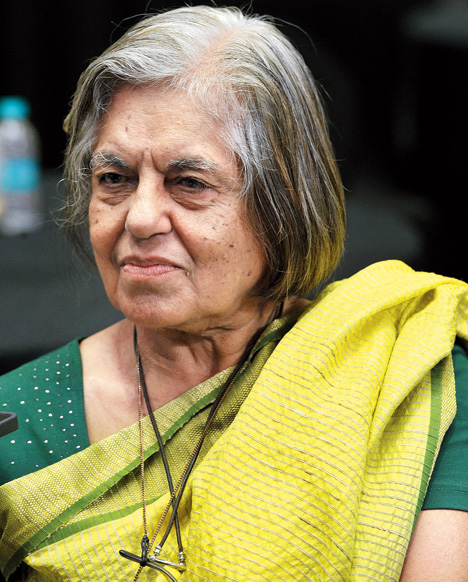
Being named as one of the World’s 50 Greatest Leaders of 2018 by Fortune magazine is the latest feather in her cap, already having achieved many firsts in the hallowed corridors of many of the courts of the country — the first woman senior advocate to be designated by the Bombay High Court, the first Indian woman to be elected to the U.N. Committee on Elimination of Discrimination against Women, and the first woman to be appointed Additional Solicitor General. In the city to speak at a panel discussion on “Redefining Success As a Woman of Today”, organised by the Ladies Study Group last month at The Westin Kolkata Rajarhat, Jaising talked about giving a voice to the voiceless and fighting for the ones in need with t2.
What do you think has been your major contribution to the Indian legal system?
I think it would be democratising the system, encouraging people to speak up, not to be afraid of judges and to demonstrate that people from the margins of society, whether they are pavement-dwellers, hawkers, women who are otherwise considered people with no rights have a stake in the legal system. They have a claim to make of the judges, of the judiciary, and having succeeded in establishing their claims is a contribution I value, I would say.
Are there enough women practising law in our country? Is the climb for them as tough as in other professions, or more?
There certainly are not enough women in the profession and the evidence of that is that we have only one woman judge in the Supreme Court. If there were more women in the legal profession, you would see more judges. I, personally, believe that there has to be a conscious effort to encourage women to help them to come up, rather than push them down. Now, they get pushed down. Unfortunately, they’re still viewed as women rather than lawyers. I have heard a woman judge of the SC when sitting in court telling a male judge to not refer to her as a woman judge because she is a “judge”. So that shows you the extent to which there is a kind of chauvinist mindset.
And do you think it’s a pan-India problem?
It’s really the case everywhere as this mindset is so pervasive. There is a great need to change that kind of a mindset and yet, things are changing because women are not willing to accept it anymore. It’s not that society has done anything for them. Women have created a society of their own around them and they have succeeded, in that sense.
What has changed since you started practising in the 1960s?
Things have changed and certainly, the number of women has gone up. But more importantly, I think it’s now possible to talk openly about what’s wrong in the judiciary. At that time, nobody would do it so openly, with the contempt of court law around it. But now, people are willing to speak up if they see something wrong.
What were some of the early challenges in your career?
The challenges could have been several but I feel that given the kind of cases I chose to do, I was fulfilling a need, which nobody was addressing. For example, the trade union movement, workers, women, homeless people — nobody thought of representing them but I did. In that sense, I fulfilled a role and a need, so I didn’t have the challenge to having to battle for work or for clients — my clients always trusted me and I always had more than enough work to do. The challenges were in the court. The judges were like, “You’re crazy! How can you say that these homeless people have a right to life and that state has a duty to provide for them?”
Of the many issues you have fought for, which one do you personally consider the most satisfying?
I once represented a 10-year-old girl who was raped and who gave birth to a child. I thought to myself I can’t live with this as a lawyer, something has to be done. So I went to court and asked the judge to ensure that her medical expenditure, education and nutrition were taken care of and that she was allowed to integrate in society. She was given an anonymous identity so that when she walked on the road, people didn’t identify her as the girl who was raped and just working towards integrating her as a normal human being in society. It was one of the most tragic cases I have ever handled in my life because I really never thought I would see the day to represent a 10-year-old who gave birth to a child. It’s the kind of case that breaks your heart. If you’re able to do something about it, it’s also the most satisfying case.
What is your message to young girls who want a career in law and are intimidated by the profession and its professionals?
I would say join the profession as there is a lot of scope for you. You can bring unique talents to the courtroom. It’s not about competing with men, it’s about your self and your commitment to human rights. And I think I am finding a lot of people, including women, who have worked in the corporate sector and have turned over and they now want to work on human rights. In a period of six months, I might have had three people coming to me from the corporate sector, saying that they want to switch to human rights, which I think is a very positive development.
Picture: Pabitra Das










